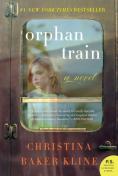BKMT READING GUIDES
Orphan Train
by Christina Baker Kline
Paperback : 278 pages
236 clubs reading this now
24 members have read this book
The #1 New York Times Bestseller
Christina Baker Kline’s Orphan Train is an unforgettable story of friendship and second chances that highlights a little-known but historically significant movement in America’s past—and it includes a special PS section for book clubs featuring ...
Introduction
The #1 New York Times Bestseller
Christina Baker Kline’s Orphan Train is an unforgettable story of friendship and second chances that highlights a little-known but historically significant movement in America’s past—and it includes a special PS section for book clubs featuring insights, interviews, and more.
Penobscot Indian Molly Ayer is close to “aging out” out of the foster care system. A community service position helping an elderly woman clean out her home is the only thing keeping Molly out of juvie and worse...
As she helps Vivian sort through her possessions and memories, Molly learns that she and Vivian aren’t as different as they seem to be. A young Irish immigrant orphaned in New York City, Vivian was put on a train to the Midwest with hundreds of other children whose destinies would be determined by luck and chance.
Molly discovers that she has the power to help Vivian find answers to mysteries that have haunted her for her entire life—answers that will ultimately free them both.
Rich in detail and epic in scope, Orphan Train is a powerful novel of upheaval and resilience, of unexpected friendship, and of the secrets we carry that keep us from finding out who we are.
Discussion Questions
1. On the surface, Vivian's and Molly's lives couldn't be more different. In what ways are their stories similar?2. In the prologue Vivian mentions that her "true love" died when she was 23, but she doesn't mention the other big secret in the book. Why not?
3. Why hasn't Vivian ever shared her story with anyone? Why does she tell it now?
4. What role does Vivian's grandmother play in her life? How does the reader's perception of her shift as the story unfolds?
5. Why does Vivian seem unable to get rid of the boxes in her attic?
6. In Women of the Dawn, a nonfiction book about the lives of four Wabanaki Indians excerpted in the epigraph, Bunny McBride writes: "In portaging from one river to another, Wabanakis had to carry their canoes and all other possessions. Everyone knew the value of traveling light and understood that it required leaving some things behind. Nothing encumbered movement more than fear, which was often the most difficult burden to surrender." How does the concept of portaging reverberate throughout this novel? What fears hamper Vivian's progress? Molly's?
7. Vivian's name changes several times over the course of the novel: from Niamh Power to Dorothy Nielsen to Vivian Daly. How are these changes significant for her? How does each name represent a different phase of her life?
8. What significance, if any, does Molly Ayer's name have?
9. How did Vivian's first-person account of her youth and the present-day story from Molly's third-person-limited perspective work together? Did you prefer one story to the other? Did the juxtaposition reveal things that might not have emerged in a traditional narrative?
10. In what ways, large and small, does Molly have an impact on Vivian's life? How does Vivian have an impact on Molly's?
11. What does Vivian mean when she says, "I believe in ghosts"?
12. When Vivian finally shares the truth about the birth of her daughter and her decision to put May up for adoption she tells Molly that she was "selfish" and "afraid." Molly defends her and affirms Vivian's choice. How did you perceive Vivian's decision? Were you surprised she sent her child to be adopted after her own experiences with the Children's Aid Society?
13. When the children are presented to audiences of potential caretakers, the Children's Aid Society explains adoptive families are responsible for the child's religious upbringing. What role does religion play in this novel? How do Molly and Vivian each view God?
14. When Vivian and Dutchy are reunited she remarks, "However hard I try, I will always feel alien and strange. And now I've stumbled on a fellow outsider, one who speaks my language without saying a word." How is this also true for her friendship with Molly?
15. When Vivian goes to live with the Byrnes Fanny offers her food and advises, "You got to learn to take what people are willing to give." In what ways is this good advice for Vivian and Molly? What are some instances when their independence helped them?
16. Molly is enthusiastic about Vivian's reunion with her daughter, but makes no further efforts to see her own mother. Why is she unwilling or unable to effect a reunion in her own family? Do you think she will someday?
17. Vivian's Claddagh cross is mentioned often throughout the story. What is its significance? How does its meaning change or deepen over the course of Vivian's life?
Suggested by Members
Book Club Recommendations
Recommended to book clubs by 354 of 362 members.
Book Club HQ to over 90,000+ book clubs and ready to welcome yours.
Get free weekly updates on top club picks, book giveaways, author events and more








